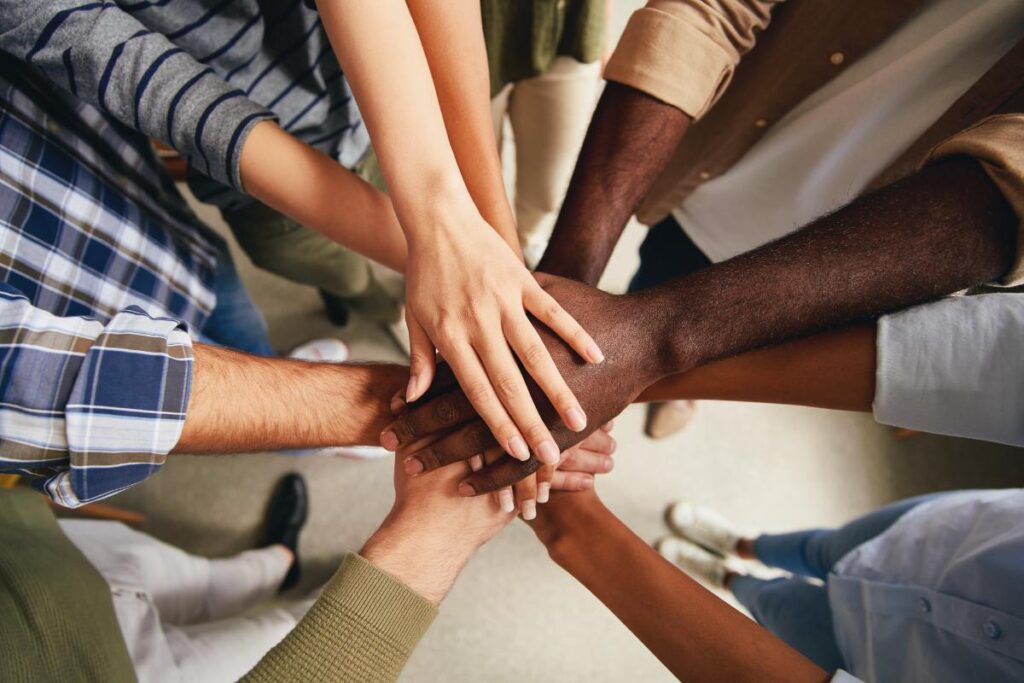When an individual is coping with addiction, the disease never affects them alone. Rather, the impact inevitably spreads to family, friends, and coworkers. It thus makes sense that recovering from substance abuse likewise has a strong social component. Humans are social creatures, and it follows that peer support is a powerful tool for regaining health after addiction. If you’re looking for services in Chicago, Texas, Ohio, Massachusetts, or Florida, contact Evoke Wellness today. Our staff is happy to answer questions about our medical and therapeutic approach to addiction recovery at 866.429.2960 or online.
Key Benefits of Group Counseling for Addiction Recovery
Group recovery interventions can take several forms. A few of the most common are group therapy sessions led by a registered clinician, peer support groups with shared leadership duties, and ongoing offerings outside rehab, such as 12-step meetings. Regardless of the exact structure, group sessions offer participants several substantial benefits, including:
- A context for vulnerability – It can be frightening to open up about challenging or stigmatized experiences like addiction. Sharing is nonetheless a vital part of recovery since it helps participants feel unburdened, build accountability, and gain perspective. Being part of a peer group serves as a major motivator for the healing act of being vulnerable. Oftentimes, once one or two people take the leap and share, many more feel safe to do so as well.
- Community – Working with peers who have similar struggles significantly counteracts the sense of isolation that often accompanies substance abuse. Especially within ongoing meetings like rehab alumni programs, group work creates social continuity. Finding a support network is essential in helping people in recovery feel strong, connected, and committed to sobriety long-term.
- Perspective – Directly witnessing others’ journeys can help those in recovery gain valuable insights about themselves. Hearing diverse viewpoints can build a broader set of coping strategies, and talking through one another’s setbacks is similarly informative.
What’s more, in ongoing groups, participants are often at quite different stages of the recovery journey. This means newer participants can gain inspiration and mentorship from those who are farther along.
Other Than Group Therapy, What Happens During Rehab?
In a qualified rehab program, you’ll begin by detoxing from any substances to which you’re addicted. This happens in a clinical setting where staff monitor your vitals, intervening if there are any severe withdrawal side effects. While detox is seldom easy, undergoing it in a hospital or clinical setting greatly improves your odds of lasting recovery. This is so because it forstalls early relapse, keeps you safe, and may afford access to pain medication.
After detox, you’ll begin individual and group counseling. In the former, you’ll likely be assessed for any potential co-occurring mental health condition. Substance abuse is commonly comorbid with psychiatric disorders such as major depression, post-traumatic stress disorder, and bipolar disorder. This makes dual diagnosis assessment a vital part of care. You’ll also learn cognitive reframing to manage cravings and work to understand the root causes of your addiction.
Finally, many rehab centers offer holistic programming to round out treatment. This may take the form of animal-assisted therapy, yoga or other exercise therapy, or mindfulness work such as meditation. All these interventions help integrate physical and psychological healing, acknowledging the fact that recovery is not a purely cognitive process. Nutrition counseling is also a valuable component of many rehabs. It shores up patients’ bodily needs after what is often a physiologically harrowing experience of substance abuse.
Schedule a Tour at Evoke Wellness and Start Healing
For evidence-supported help with addiction recovery, reach out to Evoke Wellness today. Our centers in Chicago, Texas, Ohio, Massachusetts, and Florida offer an array of effective interventions, including quality peer support. Call us today at 866.429.2960 or fill out our secure online form to reach a staff member for assistance.


